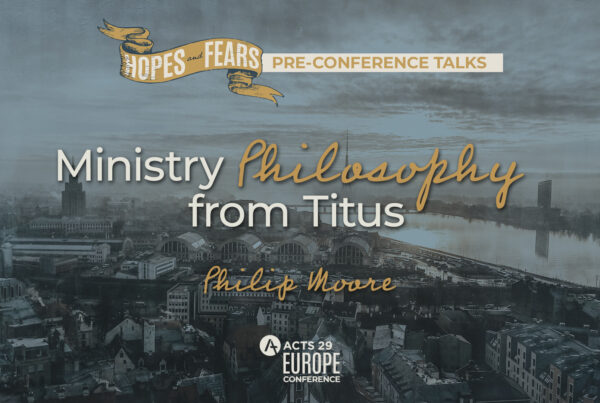Sola Scriptura is a Latin phrase that literally means “By Scripture Alone.” Sola Scriptura is the doctrine that the Bible is the only infallible and inerrant authority for Christian faith, and that it contains all knowledge necessary for salvation and holiness.
So what does this have to do with planting a church or qualifications of a pastor? People ask me if Acts 29 is affiliated with the emergent church because we used to talk about the emerging church—one that is emerging from apathy, an inward focus, from religion, from man-imposed structures that limited the advancement of the mission of God through the church. I used to say that the difference is that one has a Bible as a literal authority and the other has a Bible as a literary addendum.
The church is poisoned with false teaching and unless an authority exists, every wacky doctrine is fair game.
Restoring Sola Scriptura
The sixteenth century reformation was responsible for restoring the principle of Sola Scriptura to the church. This is a principle that had been operative within the church from the very beginning of the post-apostolic age. Initially the apostles taught orally, but with the close of the apostolic age, all special revelation that God wanted preserved for man was codified in the written Scriptures.
Martin Luther was neurotic about going to hell so he became a monk in the 16th century. He would sometimes confess his sins for 6 hours at a time. He began viewing the gospel differently than what the church was articulating. At this time there was only one church, the Catholic Church and its Pope was considered to have been successively appointed by Peter. Luther made a list of 95 issues to debate the church and nailed it to the door of the church in Wittenberg Germany in 1517. Luther was asked to recant his writings or suffer excommunication. Luther’s response is below.
“Unless I am convinced by the testimony from scripture or by evident reason—for I confide neither in the Pope nor in a Council alone, since it is certain they have often erred and contradicted themselves—I am held fast by the scriptures adduced by me, and my conscience is held captive by God’s Word, and I neither can nor will revoke anything, seeing it is not safe or right to act against conscience. God help me. Amen.“ [The New Schaff-Herzog Encyclopedia of Religious Knowledge, ed. Samuel Macauley Jackson and George William Gilmore, (New York, London, Funk and Wagnalls Co., 1908-1914; Grand Rapids, MI: Baker Book House, 1951), p. 72.]
Five Primary Views of Scripture
- Sola Ecclesia (Dual Source Theory)
- Prima Scriptura
- Regula Fidei
- Sola Scriptura
- Solo Scriptura
What is Sola Ecclesia?
This is the belief that Tradition, represented by the magisterial authority of the Roman Catholic Church, is infallible and equal to Scripture as a basis for doctrine; it is the final authority in all matters of faith and practice since it must define and interpret Scripture. In this structure, a teaching becomes infallible when the Pope speaks alone concerning matters of faith or morals (ex cathedra) or when the Pope and bishops speak together. The Catholic Catechism states, “The Church, to whom the transmission and interpretation of Revelation is entrusted, “does not derive her certainty about all revealed truths from the holy Scriptures alone. Both Scripture and Tradition must be accepted and honored with equal sentiments of devotion and reverence” (Part One, Section One, Chapter Two, Article Two, II, #82).
Sola Scriptura Put to the Test
Unfortunately, this dual authority also exists functionally among evangelicals that hold to traditions and concepts practiced in their particular church or denomination.
I had a lady say in a church-wide meeting where I was discussing establishing elders in the church in accordance with the Bible, “I don’t care what the Bible says, this is not what Baptists do.” I threw up in my mouth and didn’t respond because she was her own defender and accuser at the same time.
On another occasion, I had the largest financial contributor of a church I pastored come in to see me. The night before, we took 20 or so teenagers up to a mountain to teach them to pray. We ended the night of teaching and praying by sharing communion together. It was a stunning experience as we stood reverently at the top of the mountain that provided a panoramic view of the city upon which we were praying that God would bring His glory. Her two sons were involved. She was angry that we took communion on a Wednesday night and was announcing her departure from the church because, according to her, we are only supposed to take communion on Sundays. I handed her my Bible and asked her to show me where that principle was taught. When she wouldn’t take my Bible I placed it on top of my head (it sounds silly, I know) and said that I am under the authority of the Bible and that if I were guilty of something it commanded, I would repent. Otherwise, I am not bound by ancillary practices. Unfortunately, to the detriment of her sons, they did leave the church. In retrospect, I could have been a better shepherd-leader in that situation.
I had another large contributing married couple come see me in my office. These still bring anxiety even though I trust God’s provision. They threatened to stop giving to the church if I didn’t make the husband an elder in the church because he was one in his former church. He was clearly unqualified biblically. I leaned into the Scripture’s authority and held my ground. They stayed in the church and made a $10,000 gift the following week.
I wouldn’t know what to do in these situations if I didn’t believe in sola scriptura. God provided the church with an infallible and inerrant single source of authority. While I love the traditions and epic historical moments in the church, our authority isn’t sola ecclesia.
You will have similar stories as you plant a church and the busload of religious nut jobs show up advocating an aberrant theology that either exists in spite of Scripture (liberalism) or in addition to Scripture (legalism).
Put your Bible on your head and teach God’s Word with humble confidence.










